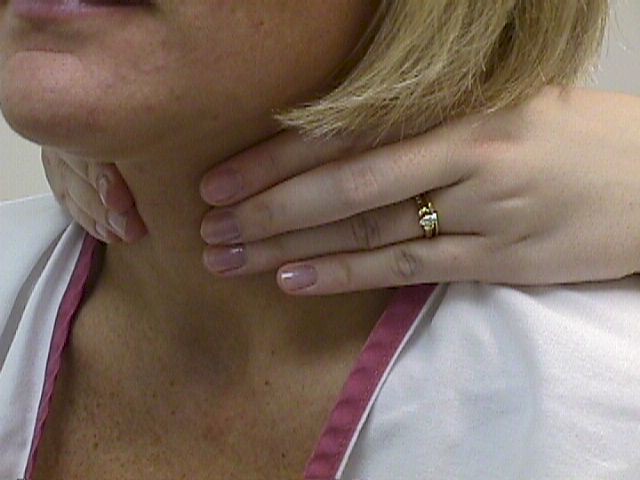Examining the Neck
Thyroid Gland
It is shaped like a butterfly, and lies in the anterior part of the neck,
below the larynx. It consists of two lobes, one on each side of the upper trachea,
connected by a strip of tissue called the isthmus. The thyroid secretes the
iodine containing hormone THYROXIN, which controls the rate of cell metabolism.
Examine the Neck
- Inspect the neck for masses or asymmetry.
- Evaluate range of motion and palpate for midline position of the trachea.
- Inspect and palpate the thyroid gland. It should be smooth,
symmetrical, and not enlarged.
- Inspect and palpate for lymph notes.
- If a node is enlarged or tender look for a source in the area that it drains. Tender nodes suggest inflammation; hard or fixed nodes suggest malignancy. Is it a node, muscle or artery: Remember you should be able to roll a node in two directions —up and down, and side to side — a muscle or artery will not pass this test.
- Check for nuchal rigidity — touch chin to sternum. Pain is a sign of meningeal irritation.

The index finger is on the cricothyroid membrane
(below). The Thyroid
cartilage (Adam's Apple) is above the finger, and the Cricoid cartilage is
below the finger.

The two soft lobes of the thyroid gland, fused in the
midline below the cricoid cartilage, rise up on either side of the
trachea.
 |
|
|
This information is provided by The Brookside Associates. The Brookside
Associates, LLC. is a private organization, not affiliated with any governmental
agency. The opinions presented here are those of the author and do not
necessarily represent the opinions of the Brookside Associates or the Department
of Defense. The presence of any advertising on these pages does not constitute
an endorsement of that product or service by either the US Department of Defense
or the Brookside Associates. All material presented here is unclassified.
C. 2009, 2014, All Rights Reserved
 |
|



